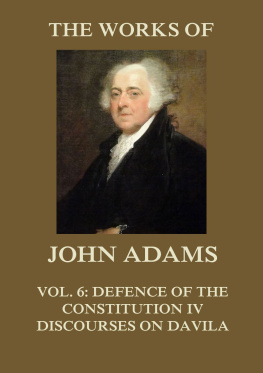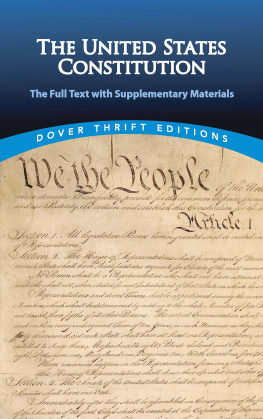preface.
THE arts and sciences, in general, during the three or four last centuries, have had a regular course of progressive improvement. The inventions in mechanic arts, the discoveries in natural philosophy, navigation, and commerce, and the advancement of civilization and humanity, have occasioned changes in the condition of the world, and the human character, which would have astonished the most refined nations of antiquity. A continuation of similar exertions is every day rendering Europe more and more like one community, or single family. Even in the theory and practice of government, in all the simple monarchies, considerable improvements have been made. The checks and balances of republican governments have been in some degree adopted by the courts of princes. By the erection of various tribunals, to register the laws, and exercise the judicial power by indulging the petitions and remonstrances of subjects, until by habit they are regarded as rights a control has been established over ministers of state, and the royal councils, which approaches, in some degree, to the spirit of republics. Property is generally secure, and personal liberty seldom invaded. The press has great influence, even where it is not expressly tolerated; and the public opinion must be respected by a minister, or his place becomes insecure. Commerce begins to thrive: and if religious toleration were established, and personal liberty a little more protected, by giving an absolute right to demand a public trial in a certain reasonable time and the states invested with a few more privileges, or rather restored to some that have been taken away these governments would be brought to as great a degree of perfection, they would approach as near to the character of governments of laws and not of men, as their nature will probably admit of. In so general a refinement, or more properly reformation of manners and improvement in knowledge, is it not unaccountable that the knowledge of the principles and construction of free governments, in which the happiness of life, and even the further progress of improvement in education and society, in knowledge and virtue, are so deeply interested, should have remained at a full stand for two or three thousand years?
According to a story in Herodotus, the nature of monarchy, aristocracy, and democracy, and the advantages and inconveniences of each, were as well understood at the time of the neighing of the horse of Darius, as they are at this hour. A variety of mixtures of these simple species were conceived and attempted, with different success, by the Greeks and Romans. Representations, instead of collections, of the people a total separation of the executive from the legislative power, and of the judicial from both and a balance in the legislature, by three independent, equal branches are perhaps the three only discoveries in the constitution of a free government, since the institution of Lycurgus. Even these have been so unfortunate, that they have never spread: the first has been given up by all the nations, excepting one, who had once adopted it; and the other two, reduced to practice, if not invented, by the English nation, have never been imitated by any other except their own descendants in America.
While it would be rash to say, that nothing further can be done to bring a free government, in all its parts, still nearer to perfection the representations of the people are most obviously susceptible of improvement. The end to be aimed at, in the formation of a representative assembly, seems to be the sense of the people, the public voice: the perfection of the portrait consists in its likeness. Numbers, or property, or both, should be the rule; and the proportions of electors and members an affair of calculation. The duration should not be so long that the deputy should have time to forget the opinions of his constituents. Corruption in elections is the great enemy of freedom. Among the provisions to prevent it, more frequent elections, and a more general privilege of voting, are not all that might be devised. Dividing the districts, diminishing the distance of travel, and confining the choice to residents, would be great advances towards the annihilation of corruption. The modern aristocracies of Holland, Venice, Berne, &c. have tempered themselves with innumerable multitudes of checks, by which they have given a great degree of stability to that form of government: and though liberty and life can never be there enjoyed so well as in a free republic, none is perhaps more capable of profound sagacity. We shall learn to prize the checks and balances of a free government, and even those of the modern aristocracies, if we recollect the miseries of Greece which arose from their ignorance of them. The only balance attempted against the ancient kings was a body of nobles; and the consequences were perpetual altercations of rebellion and tyranny, and butcheries of thousands upon every revolution from one to the other. When the kings were abolished, the aristocracies tyrannized; and then no balance was attempted but between aristocracy and democracy. This, in the nature of things, could be no balance at all, and therefore the pendulum was forever on the swing.
It is impossible to read in Thucydides, his account of the factions and confusions throughout all Greece, which were introduced by this want of an equilibrium, without horror. During the few days that Eurymedon, with his troops, continued at Corcyra, the people of that city extended the massacre to all whom they judged their enemies. The crime alleged was, their attempt to overturn the democracy. Some perished merely through private enmity; some, for the money they had lent, by the hands of the borrower. Every kind of death, every dreadful act, was perpetrated. Fathers slew their children; some were dragged from altars, some were butchered at them; numbers, immersed in temples, were starved. The contagion spread through the whole extent of Greece: factions raged in every city; the licentious many contending for the Athenians, and the aspiring few for the Lacedaemonians. The consequence was, seditions in cities, with all their numerous and tragical incidents.











